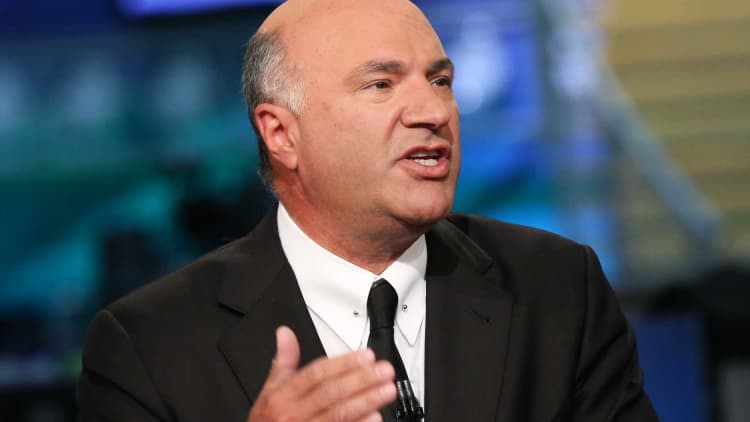Over the course of his career as an entrepreneur and investor, Kevin O'Leary, star of ABC's "Shark Tank," has noticed a trend in his top performing investments: They're businesses owned or run by women.
"I've been investing now for over 10 years on things like 'Shark Tank' deals — and other deals that are brought to me because of 'Shark Tank' — and the majority of my returns come from the companies run by women," O'Leary tells CNBC Make It of his portfolio.
"Now this isn't some kind of academic research, this is real data. This is real money coming back to me," he adds.
For example, O'Leary says an investment in Wicked Good Cupcakes, founded by mother-daughter duo Tracey Noonan and Danielle Vilagie, is one of the most lucrative he's made on "Shark Tank."
Sara Margulis, who landed a deal with O'Leary on season six of "Shark Tank" as the CEO and co-founder of Honeyfund, a platform for crowdfunding honeymoons, says the success of women-led ventures has lead O'Leary to be proactive about funding women.
"Of all the sharks, he's someone who really has noticed that in his portfolio all of his returns are coming from women-led or women-owned companies," Margulis tells CNBC Make It. "He has a huge amount of respect for when a woman walks into 'Shark Tank.'
"The returns are the returns and they speak for themselves," says Margulis.
Here are three reasons why O'Leary says women excel at entrepreneurship.
1. Time management

"If you want something done, give it to a busy mother. That's an old adage and it's true in business," O'Leary says.
The time taken away from work to raise children, or the "motherhood penalty," is often cited as a contributor to the pay disparity between men and women, and numbers bear that out: The earnings of women who have children fall behind men by 20 percent due to time away from their careers, according to a 2018 working paper by the National Bureau of Economic Research, which analyzed data from Denmark.
But for entrepreneurs, O'Leary says the multi-tasking abilities of someone who's balanced child rearing with a career are a huge advantage.
"Women are very good at allocating their time, so they know what to do not only with their time, but with their employees' [time,]" he explains. "A lot of my companies that are small, average size, 25 employees, [so] it really matters what everybody is doing."
Margulis, a mother herself, agrees: "[Moms] already know how to time manage, we already know how to juggle all the balls," she says. "We're getting the kids to school, or making the lunches. We're setting up the doctor's appointments, we're taking [the kids to] Little League. We already have so much happening in our lives that it is very natural to wear so many hats, and I think that for women, that translates really well into the workplace."
2. Setting realistic goals

O'Leary also sees women leaders set more realistic goals for their companies. And that's key for creating a successful work environment, he says.
"In my portfolios, women hit their objectives in sales 95 percent of the time," he says. "Men only 65 percent.
"What's going on there, and why should you care?" says O'Leary. "Men are setting goals, in my case anyways, much, much higher and then only achieve them 65 percent of the time."
If employees aren't meeting their goals, that frustration can lead to turnover, which is particularly costly for small operations. Women are better at avoiding this pitfall, he says.
"When you meet your goals 95 percent of the time, you change the culture of your business. People feel they're working in a winning organization," O'Leary says. "That's why women are doing better in business — they keep their people. The staff are sticky. They want to work there because they're hitting their goals."
O'Leary says it's a tip for setting goals anyone can use in their career: "You don't have to reach for the stars, you want to win 95 percent of the time. That's the secret sauce."
3. Listening to critique

"Lastly, women listen," O'Leary says.
"Who are you serving when you're running a business? Number one your customers, number two your employees and number three your shareholders," O'Leary says, and to succeed, executives need to listen to everyone. That's something women excel at, especially with critical feedback.
"They listen to all of them, they take the advice, they take the information and they pivot," O'Leary says. "Understanding when you're going in the wrong direction is the tell of a great entrepreneur. Women are very good at listening, assimilating and redirecting, and that's how you make it in business."
Of course, women entrepreneurs still encounter many obstacles.
Among the firms doling out venture capital funding — the main avenue for start-ups to get money — women represent 11 percent of decision makers, according to a the most recent 2016 report from the National Venture Capital Association (NVCA) and Deloitte.
And only 12 percent of venture capital dollars go to founding teams with at least one female member, according to data provided to CNBC Make It by PitchBook, which studies market data.
But for O'Leary, investing in women-built businesses has been a key to success.
"I can't express how much I'm inspired by the business women I've had the pleasure of partnering with on ['Shark Tank']," O'Leary tweeted on International Women's Day March 8. "They impress me more every day with their innovation, strength, and tenacity!"
Don't miss: Kevin O'Leary: Unless you can pass this two-question test, don't buy a home
Like this story? Like CNBC Make It on Facebook!

Disclaimer: CNBC owns the exclusive off-network cable rights to "Shark Tank."


